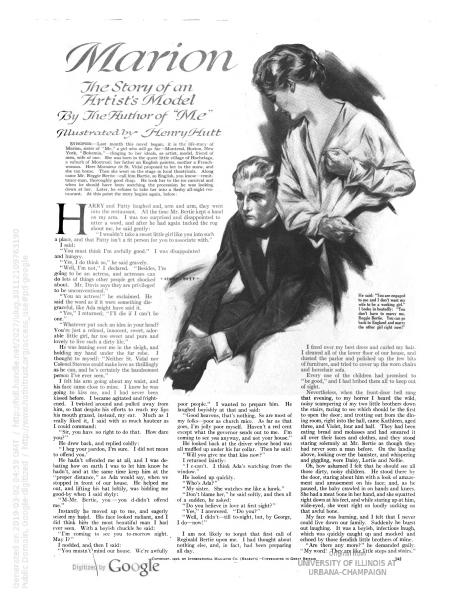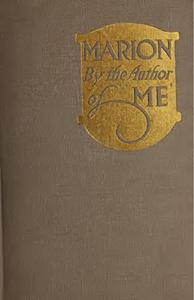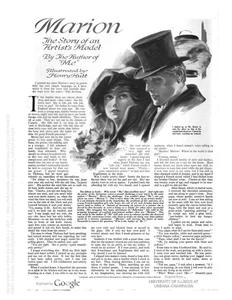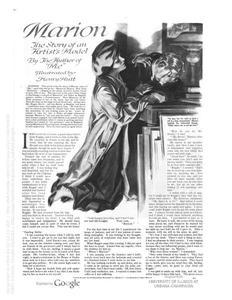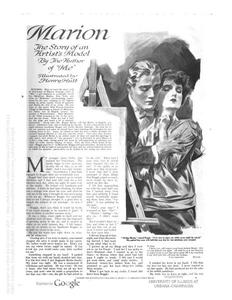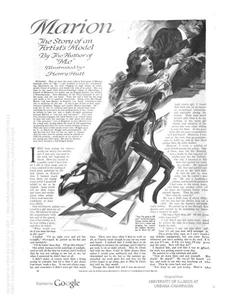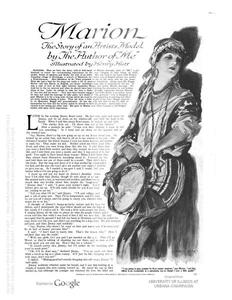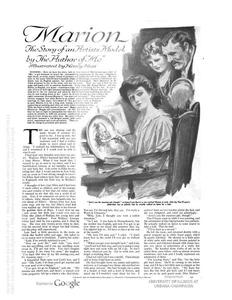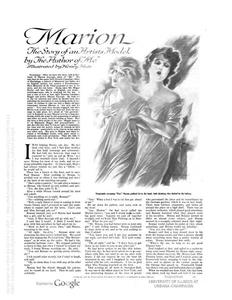Synopsis:—Last month this novel began; it is the life-story of Marion, sister
of “Me,” a girl who will go far—Montreal, Boston, New York,
“Bohemia,”—clinging to her ideals, as artist, model, friend of men, wife
of one. She was born in the queer little village of Hochelaga, a suburb of
Montreal; her father an English painter, mother a Frenchwoman. Here Monsieur de St. Vidal proposed to her in the snow,
and she ran home. Then she went on the stage in local theatricals. Along came
Mr. Reggie Bertie—call him Bartie, so English, you know—remittance-man,
thoroughly good chap. He took her to the ice carnival and when he should have
been watching the procession he was looking down at her. Later, he refuses to
take her into a flashy all-night restaurant. At this point the story begins
again, below:
Harry and Patty laughed and, arm and arm, they went into the restaurant. All the
time Mr. Bertie kept a hand on my arm. I was too surprised and disappointed to
utter a word, and after he had again tucked the rug about me, he said gently:
“I wouldn’t take a sweet little girl like you into such a place, and that Patty
isn’t a fit person for you to associate with.”
I said:
“You must think I’m awfully good.” I was disappointed and hungry.
“Yes, I do think so,” he said gravely.
“Well, I’m not,” I declared. “Besides, I’m going to be an actress, and
actresses can do lots of things other people get shocked about. Mr. Davis says
they are privileged to be unconventional.”
“You an actress!” he exclaimed. He said the word as if it were something
disgraceful, like Ada might have said it.
“Yes,” I returned; “I’ll die if I can’t be one.”
“Whatever put such an idea in your head? You’re just a refined, innocent, sweet,
adorable little girl, far too sweet and pure and lovely to live such a dirty
life.”
He was leaning over me in the sleigh, and holding my hand under the fur robe. I
thought to myself: “Neither St. Vidal nor Colonel Stevens could make love as
thrillingly as he can, and he’s certainly the handsomest person I’ve ever
seen.”
I felt his arm going about my waist, and his face came close to mine. I knew he
was going to kiss me, and I had never been kissed before. I became agitated and
frightened. I twisted around and pulled away from him, so that despite his efforts
to reach my lips his mouth grazed, instead, my ear. Much as I really liked it, I
said with as much hauteur as I could command:
“Sir, you have no right to do that. How dare you?”
He drew back, and replied coldly:
“I beg your pardon, I’m sure. I did not mean to offend you.”
He hadn’t offended me at all, and I was debating how on earth I was to let him
know he hadn’t, and at the same time keep him at the “proper distance,” as
Ada would say, when we stopped in front of our house. He helped me out, and
lifting his hat loftily, was bidding me good-by when I said shyly:
“M-Mr. Bertie, you—you d-didn’t offend me.”
Instantly he moved up to me, and eagerly seized my hand. His face looked radiant,
and I did think him the most beautiful man I had ever seen. With a boyish chuckle
he said:
“I’m coming to see you to-morrow night. May I?”
I nodded, and then I said:
“You mustn’t mind our house. We’re awfully poor people.” I wanted to prepare
him. He laughed boyishly at that and said:
“Good heavens, that’s nothing. So are most of my folks—poor as church mice. As
far as that goes, I’m jolly poor myself. Haven’t a red cent except what the
governor sends out to me. I’m coming to see you anyway, and not
your house.”
He looked back at the driver whose had was all muffled up under his fur collar.
Then he said:
“Will you give me that kiss now?”
I returned faintly:
“I c-can’t. I think Ada’s watching from the window.”
He looked up quickly.
“Who’s Ada?”
“My sister. She watches me like a hawk.”
“Don’t blame her,” he said softly, and then all of a sudden, he asked:
“Do you believe in love at first sight?”
“Yes,” I answered. “Do you?”
“Well, I didn’t—till to-night, but, by George, I do—now!”
I am not likely to forget that first call of Reginald Bertie upon me. I had
thought about nothing else, and, in fact, had been preparing all day.
I fixed over my best dress and curled my hair. I cleaned all of the lower floor of
our house, and dusted the parlor and polished up the few bits of furniture, and
tried to cover up the worn chairs and horsehair sofa.
Every one of the children had promised to “be good,” and I had bribed them
all to keep out of sight.
Nevertheless, when the front-door bell rang that evening, to my horror I heard the
wild, noisy scampering of my two little brothers down the stairs, racing to see
which should be the first to open the door; and trotting out from the dining room,
right into the hall, came Kathleen, aged three, and Violet, four and half. They
had been eating bread and molasses and had smeared it all over their faces and
clothes, and they stood staring solemnly at Mr. Bertie as though they had never
seen a man before. On the landing above, looking over the banister, and whispering
and giggling, were Daisy, Lottie and Nellie.
Oh, how ashamed I felt that he should see all those dirty, noisy children. He
stood there by the door, staring about him with a look of amazement and amusement
on his face; and, as he paused, the baby crawled in on hands and knees. She had a
meat bone in her hand, and she squatted right down at his feet, and while staring
up at him, wide-eyed, she went right on loudly sucking on that awful bone.
My face was burning, and I felt that I never could live down our family. Suddenly
he burst out laughing. It was a boyish, infectious laugh, which was quickly caught
up and mocked and echoed by those fiendish little brothers of mine.
“Are there any more?” he demanded gaily. “My word! They are like little
steps and stairs.”
346
I said: “How do you do, Mr. Bertie?”
He gave me a quizzical glance, and said in a low voice:
“What’s the matter with calling me ‘Reggie?’”
Mr. Bertie, or “Reggie,” as he said I was to call him, followed me into the
“parlor.” It was a room we seldom used in winter on account of the cold,
but I had coaxed dear papa to help me clean out the fireplace, the only way it was
heated—our Canadian houses did not have furnaces in those days—and the boys had
brought me in some wood from the shed. So, at least, we had a cheerful fire
crackling away in the grate, and although our furniture was old, it did not look
so bad. Besides, he didn’t seem to notice anything except me, for as soon as we
got insidehe seized my hands and said:
“Give you my word, I’ve been thinking about you ever since last night.”
Then he pulled me up toward him, and said:
“I’m going to get that kiss to-night.”
Just then in came mama and Ada, and feeling awfully embarrassed and confused, I
had to introduce him. Mama only stayed a moment, but Ada settled down with her
crochet work by the lamp. She never worked in the parlor on other nights, but she
sat there all of that evening, with her eye on Mr. Bertie and occasionally saying
something brief and sarcastic. Mama said, as she was going out:
“I’ll send papa right down to see Mr. Bertie. He looks so much like papa’s
brother who died in India. Besides, papa always likes to meet anyone from
home.”
Papa came in later, and he and Mr. Bertie found much to talk about. They had lived
in the same places in England, and even found they knew some mutual friends and
relatives. Papa’s sisters were all famous sportswomen and hunters. One was the
amateur tennis champion, and, of course, Mr. Bertie had heard of her.
Then papa inquired what he was doing in Montreal, and Bertie said he was studying
law, and hoped to pass his finals in about eight months. Then he added that as
soon as he could get together a fair practice, he expected to marry and settle
down in Montreal. When he said that, he looked directly at me, and I blushed
foolishly, and Ada coughed significantly and skeptically.
I really didn’t get a chance to talk to him all evening, and even when he was
going I could hardly say good-by to him for mama came back with Daisy and Nellie,
the two girls next to me, and what with Ada and papa there besides, and everybody
wishing him good-by and mama inviting him to call again, I found myself almost in
the background. He smiled, however, at me over mama’s head, and he said, while
shaking hands with her:
“I’ll be delighted. May I come—er—to-morrow night?”
I saw Ada glance at mama, and I knew what was in their minds. Were they to be
forced to go through this all again? The dressing up, the suppressing of the
children, the using of the unused parlor, the burning of our fuel in the
fireplace, etc. Papa, however, said warmly:
“By all means. I’ve some pretty good sketches of Macclesfield I’d like to show
you.”
“That will be charming,” said my caller and, with a smile and bow that
included us all, he was gone.
I did not get that kiss after all, and I may as well confess I was
disappointed.
The winter was passing into spring and Reggie had been a regular visitor at our
house every night. The family had become used, or as Ada put it, “resigned,”
to him. Though she regarded him with suspicion, and thought papa ought to ask his
“intentions,” she knew that I was deeply in love with him. She had wrung
this admission from me and she expressed herself as being sorry for me.
Because of Reggie’s dislike for everything connected with the stage, I had stopped
my elocution lessons and I was making a bit of money at my painting. We had had a
fine Carnival that winter, and I did a lot of work for an art store, painting snow
scenes and sports on diminutive toboggans as souvenirs of Canada. These American
visitors bought, and I had for a time all the work I could do. This work and, of
course, Reggie’s strenuous objections, kept my mind from my former
infatuation.
One night he took me to see Julia Marlowe in “Romeo and Juliet.” All my old
passion and desire to act swept over me, and I nearly wept to think of having to
give it up. When we were going home, I told Reggie how I felt, and this is what he
said:
“Marion, which would you prefer to be, an actress or my wife?”
We had come to a standstill in the street. Everything was quiet and still, and the
balmy sweetness of the spring night seemed to enwrap even this ugly quarter of the
city in a certain charm and beauty. I felt a sweet, thrilling sense of deep
tenderness and yearning toward Reggie, and also a feeling of gratitude and
humility. It seemed to me that he was stooping down from a very great height to
poor insignificant me. More than ever he seemed a wonderful and beautiful hero in
my young eyes.
“Well, dear?” he prompted, and I answered with a soft question:
“Reggie, do you really love me?”
“My word, darling,” was his reply. “I fell in love with you that first
night.”
“But perhaps that was because I—I looked so nice as Marie St. Claire,” I
suggested tremulously. I wanted to be, oh, so sure of Reggie.
“You little goose,” he laughed; “it was because you were you. Give me that
kiss now. It’s been a long time coming.”
I had known him three months, but not till that night had we had an opportunity
for “that kiss,” and it was sweet, and I was the very happiest
girl in the world.
“Now we must hurry home,” said Reggie, “as I want to speak to your
father—that’s the proper thing to do, you know.”
“Let’s not tell papa yet,” I said.
“I hate the 347proper thing, Reggie. Why do you always want to be ‘proper’?”
Reggie looked at me, surprised.
“Why, dear girl, it’s the proper thing to be—er—proper, don’t you know.”
There was something so stolidly British about Reggie and his reply. It made me
laugh, and I slipped my hand through his arm, and we went happily down the street.
Just for fun—I always liked to shock Reggie; he took everything so seriously—I
said:
“Don’t be too cocksure I’ll marry you. I still would love to be an
actress.”
“My word, Marion,” said he. “Whatever put such a notion in your head? I
wish you’d forget all about the rotten stage. Actresses are an immoral
lot.”
“Can’t one be immoral without being an actress?” I asked meekly.
“We won’t discuss that,” said Reggie, a bit testily. “Let’s drop the
subject.”
When he was going that night, and after he had kissed me good-by several times in
the dark hall, he said—but as if speaking to himself:
“Gad! but the governor’s going to be purple over this.”
“The governor” was his father
The summer days are coming
The blossoms deck the bough,
The bees are gaily humming
And the birds are singing now.
I was singing and thumping on our old cracked piano. Ada said:
“For heaven’s sake, Marion, stop that noise, and listen to this
advertisement.”
I had been looking in the papers for some time, in the hopes of getting some
permanent work to do. I was not making much money at my fancy painting, and
business was very bad. Ada was working on the “Star,” and was helping the
family considerably. She was the most unselfish of girls, and used to bring
everything she earned to mama. She fretted all the time about the family and
especially mama, to whom she was devoted. Poor little soul, it did seem as if she
carried the whole weight of our troubles on her little shoulders.
I had been engaged to Reggie now a year. He had failed in his law examinations,
and that meant another year of waiting, for, he said, it would be impossible to
marry until he passed. He had decided to go to England this summer, to see if
“the governor” wouldn’t
“cough up” some more cash, and he said he
would then tell his family about our engagement. He had not told them that yet. He
had expected to, after passing his examinations,
414but having failed in
these he had put it off, he explained to me.
Anyway, Ada insisted that it was about time for me to do something toward the
support of our family. Here I was nineteen years old and scarcely earning enough
to pay for my own board and clothes.
“Read that.”
She handed me the “Star,” and pointed to the advertisement:
“WANTED—A young lady who has talent to work for an artist. Apply to Count von
Hatzfeldt, Chateau de Ramezay, Rue Notre Dame.”
“Why,” I exclaimed, “that must be the old seigniory near the Notre Dame
Cathedral.”
I was as eager as Ada, and immediately set out for the Chateau de Ramezay.
When we reached the French Hospital, “Hotel Bon Dieu,” the conductor told me
to get off, as the Chateau was on the opposite side a little farther up the
hill.
I went up the steps of the Chateau and banged on the great iron knocker. No one
answered. So I pushed the huge heavy door open—it was not locked—and went in. The
place seemed entirely deserted and empty, and so old and musty even the stair
seeming crooked and shaky. I wandered about until finally I came to a door on the
second floor, with a card nailed on it, bearing the name: “Count von
Hatzfeldt.”
I knocked, and the funniest little old man opened the door, and stood blinking at
me.
415“Count von Hatzfeldt?” I inquired.
Ceremoniously he bowed, and holding the door open, ushered me in. He had
transformed that great room into a wonderful studio.
“I will want you to work on this heraldry,” he said, and indicated a long
table, scattered with water-color paper, water colors, and sketches of different
coats of arms. “I will sketch in the coat of arms, and you will do the painting,
young lady. We use this gold and silver and bronze a great deal. This, I
suppose, you know, is called ‘painting en
gouche.’”
I assured him I could do it. Papa had often painted in that medium, and had taught
me.
“Ya, ya! Vell, I will try you then. Come you to work to-morrow and if you do
vell, you shall have five dollar a veek. For that you vill vork on the Coat of
Arms two hours a day, and if I find you can help me mit the portraits—it maybe
you can lay in the bag-grounds, also the clothes—if so, I vill pay you some
little more. Ya, ya!” He rubbed his hands and smiled at me.
“Now,” said he, “the pusiness talk it is all done. Ya, ya!”
He said “ya, ya!” constantly when he was thinking.
“I have met your good papa,” he went on, “and I like him much. He is a man
of great gift, but—”
He threw out his hands expressively.
“Poor papa,” I thought. “I suppose he lets the Count see how unbusinesslike
and absent-minded he is.”
After a moment the Count said:
“His—your papa’s face—it is a typical Northern one—such as we see plenty in
Scandinavia— ya, ya!”
“Papa is half Irish and half English,” I said.
He nodded.
“Ya, ya, it is so. Nevertheless his face is Northern. It is typical, and
you—” He regarded me smilingly. “Gott! You look like one little Indian
girl that I meet when I live in the North. Her father, the people told me, was
one big rich railway man of Canada, but he did not know that pretty little
Indian girl, she is his daughter. Ya, ya!”
He rubbed his hands, and nodded his head musingly, as he studied me. Then:
“Come, I vill show you the place here.”
Pulling aside a curtain covering a large window (the Count shut out all the light
except the north light), he showed me the great panorama of the city below us. We
looked across the St. Lawrence River, and in the street directly below was the old
Bonsecours market. I could see the carts of the “habitants” (farmers) loaded with vegetables, fruit and fresh
maple syrup, some of it of the consistency of jelly. Never have I tasted such
maple syrup since I left Canada. In the midst stood the old Bonsecours Church.
“Good people,” it seemed to say, benevolently, “I am watching over you
all!”
“It is,” said the Count, “the most picturesque place in Montreal. Some day
I will paint it, and then it shall be famous.”
To my surprise, Reggie was not at all pleased when I told him of the work I had
secured. I had been so delighted, and papa, too, thought it an excellent thing for
me. He said the count was a genius, and I would learn a great deal from him.
Reggie, however, looked so glum and sulky, and said in his prim English way:
“You are engaged to be married to me, and I don’t want my wife to be a working
girl.”
“But, Reggie,” I exclaimed, “I have been working at home, doing all kinds
of painting for different people and helping papa.”
“That’s different,” he said sulkily. “A girl can work at home without
losing her dignity, but when she goes out—well, she’s just a working girl,
that’s all. Nice girls at home don’t do it. My word! My people would take a fit
if they thought I married a working girl. I’ve been trying to break it to them
gradually about our engagement. I told them I know very well a girl who was the
granddaughter of Squire Ascough of Macclesfield, but I haven’t had the nerve
yet to tell them—to—er—”
I knew what he meant. He hadn’t told them about us here, how poor we were, of our
large family, and how we all had to work.
“I don’t care a snap about your old people,” I broke in heatedly, “and you
don’t have to marry me, Reggie Bertie. You can go back to England and marry the
girl they want you to over there.” (He had told me about her.) “And,
anyway, I’m sick and tired of your old English prejudices andnotions, and you
can go right now—the sooner the better. I hate you.”
The words had rushed out of me headlong. I was furious at Reggie and his people.
He was always talking about them, and I had been hurt and irritated by his failure
to tell them about me. If he were ashamed of me and my people I wanted nothing to
do with him, and now his objecting to my working made me indignant and angry.
Reggie, as I spoke, had turned deathly white. He got up as if to go, and slowly
picked up his hat. I began to cry, and he stood there hesitating before me.
“Marion, do you mean that?” he asked huskily. I said weakly:
“N-no, b-but I shan’t give up the work. I gave up acting for you, but I won’t my
painting. I’ve got to work!”
Reggie drew me down to the sofa beside him.
“Now, old girl, listen to me. I’ll not stop your working for this Count, but I
want you to know that it’s because I love you I want my wife to be able to hold
her head up with the best in the land, and none of our family—none of our women
folk—have ever worked. As far as that goes, jolly few of the men have. I never
heard of such a thing in our family.”
“But there’s no disgrace in working. Poor people have to do it,” I protested.
“Only snobs and fools are ashamed of it.”
“Nevertheless, it’s not done by nice people, Marion. It’s not proper, you
know.”
I pushed him away from me.
“Oh, you make me sick,” I said. “My brother-in-law, Wallace Burrows, would
call that sort of talk rank snobbery. In the States women think nothing of
working. They are proud to do it, women of the best families.”
Reggie made a motion of complete distaste. The word “States” was always to
Reggie like a red rag to a bull.
“My dear Marion, are you going to hold up the narsty Yankees as an example to
me? My word, old girl! And as for that brother-in-law of yours, I say, he’s
hardly a gentleman, is he. Didn’t you say the fellow was a—er—journalist or
something like that?”
I jumped to my feet.
“He’s a better kind of gentleman than you are!” I cried. “He’s a genius,
and—and—and— How dare you say anything about him! We all love him and are proud
of him.”
I felt my breath coming and going and my fist doubling up. I wanted to
pummel Reggie just then.
“Come, come, old girl,” he said. “Don’t let’s have a narsty scene. My word,
I wouldn’t quarrel with you for worlds. Now, look here, darling, you shall do
as you like and even if the governor cuts me off, I’ll not give up my
sweetheart.”
He looked very sweet when he said that, and I melted in an instant. All of my
bitterness and anger vanished. Reggie’s promise to stand by me in spite of his
people appealed to me as romantic and fine.
“Oh, Reggie, if they do cut you off, will you work for me with your hands?” I
cried excitedly.
“My word, darling, how could I?” he exclaimed. “I’m blessed if I could earn
a tuppence with them. Besides, I could hardly do work that was unbecoming a
gentleman, now could I, darling?”
I sighed.
“I suppose not, Reggie, but do you know, I believe I’d love you lots more if you
were a poor beggar. You’re so much richer than I am now, and
somehow—somehow—you seem sort of selfish, and as if you could never understand
how things are with us. You seem—always—as if you were looking down on us. Ada
says you think we aren’t as good as you are.”
“Oh, I say, Marion, that’s not fair. I’ve always said your father was a
gentleman. Come, come!” he added peevishly; “don’t let’s argue, there’s a
good girl. It’s so jolly uncomfortable, and just think, I shan’t be with you
much longer now.”
He was to sail for England the following week. I was wearing his ring, a lovely
solitaire. In spite of all his prejudices and his selfishness, Reggie had lots of
lovable traits, and he was so handsome. Then, too, he was really very much in love
with me, and was unhappy about leaving me.
The day before he went he took me in his arms, and said almost fiercely:
“Marion, if you ever deceive me, I will kill you and myself, too. I know I ought
to trust you, but you’re so devilishly pretty, and I can’t help being jealous
of every one who looks at you. What’s more, you aren’t a 416bit like
the girls at home. You say and do really shocking things, and sometimes, do you
know, I’m really alarmed about you. I feel as if you might do something while
I’m away that wouldn’t be just right, you know.”
I put my hand on my heart and solemnly I swore never, never to deceive Reggie, and
to be utterly true and faithful to him forever. Somehow, as I spoke, I felt as if
I were pacifying a spoiled child.
All of that summer I worked for the old Count. Besides the heraldry work, I
assisted him with the restoration of the old oil portraits, some of which we had
to copy completely. The Count had not much patience with the work the Society set
him to do, and he let me do most of the copying, while he worked on other painting
more congenial to him.
He was making a large painting of Andromeda, the figure of a nude woman tied to
the rocks, and in the clouds Perseus coming to deliver her. He had a very pretty
girl named Lil Markey to pose for this.
My father was a landscape and marine painter, and never used models, and the first
time I saw Lil I was repulsed and horrified. She came tripping into the studio
without a stitch on her, and she even danced about and seemed to be amused by my
shocked face. I inwardly despised her. Little did I dream that the time would come
when I, too, would earn my living in that way.
Lil was not exactly a bad girl, but sort of reckless and lacking entirely in
modesty. She did have some decent homely traits, however. She would wrap a piece
of drapery about her and say:
“You folks go on painting, and I’ll be the cook.”
Then she would disappear into the kitchen and come back presently with a delicious
lunch which she had cooked all herself. I was afraid the Count was falling in love
with her, for he used to look at her lovingly and sometimes he called her
“Countess.” Lil would make faces at him behind his back, and whisper to
me: “Golly, he looks like a dying duck.”
Twice a week, the Count had pupils, rich young women mostly, who learned to paint
just as they did to play the piano and to dance. The Count would make fun of them
to Lil and me. They would take a canvas and copy one of the Count’s pictures, he
doing most of the work. Then he would practically repaint it.
One morning there came a rat-a-tat-tat on the big iron knocker. I called:
“Come in,” and Mrs. Wheatley, an English woman, accompanied by her daughter,
Alice, a pretty girl of fifteen, entered. She came directly over to me, with her
hand held out graciously.
“How do you do, Marion? I have been hearing about the Count, and I want you to
introduce us.”
I did so, of course, and she went on to tell the Count that she wanted her
daughter’s portrait painted.
“Just the head and shoulders, Count, and as Miss Marion is here—her father and I
are old friends—I shall not consider it necessary to come to the sittings.
Marion will, I am sure, chaperon my little girl,” and she smiled at me
sweetly.
The Count was much pleased, and I could see his eyes sparkling as he looked at
Alice. She was lovely, in coloring like a rosebud, and her hair was a beautiful
reddish gold. Her mother was a woman of about forty-five, rather plump, who
affected babyish hats and fluffy dresses and tried to look younger than she was.
After the Count had named a price she thought reasonable, she said Alice would
come the next day. The Count was very gallant and polite to her and she seemed
much impressed by his fine manners and I suppose, title.
“I have such a lovely old gold frame, Count,” she said, “and I thought
Alice’s hair would just match it and look lovely in it.”
The Count threw up his hands and laughed when the door closed upon her. But he
anticipated with pleasure painting the pretty Alice. The following day Alice came
alone, and soon we had her seated on the model’s platform. She was a gentle, shy
little thing, rather dull, yet so sweet and innocent that she made a most
appealing picture. The Count soon discovered that her neck was as lovely as her
face. In her innocence, Alice let him slip the drapery lower and lower until her
girlish bosoms were partly revealed. The Count was charmed with her as a model. He
made two pictures of her, one for himself, with her neck and breasts uncovered,
and the other for her mother, muffled up with drapery to the neck.
A few weeks later, after the pictures were finished, I was crossing the street,
when Mrs. Wheatley came rushing up to me excitedly:
“Miss Ascough! I am furious with you for allowing that wicked old Count to paint
my Alice’s portrait as I am told he did. Every one is talking about the picture
in his studio. It is disgraceful! An outrage!”
“Oh, no, Mrs. Wheatley,” I tried to reassure her, “it is not disgraceful,
but beautiful, and the Count says that all beauty is good and pure and that is
art, Mrs. Wheatley. Indeed, indeed, it is.”
“Art! Hmp! The idea. Art! Do you think I want my Alice shown like those brazen
hussies in the art galleries? I am surprised at you, Marion Ascough, and I
advise you for the sake of your family to be more careful of your reputation. I
am going right over to that studio now and I will put my parasol through that
disgraceful canvas.”
Fairly snorting with indignation and desire for vengeance, this British matron
betook herself in the direction of the Château. Fortunately I was younger, and
more fleet-footed than she, and I ran all of the way, and burst into the
studio:
“Count Hatzfeldt! Count Hatzfeldt! Hurry up and hide Alice’s picture. Mrs.
Wheatley is coming to poke a hole in it.”
Just as we were speaking, there came an impatient rap upon the door and the Count
shoved his arms into the sleeves of his old velvet smoking-jacket, and himself
flung the door open. Before Mrs. Wheatley, who was out of breath, could say a
word, he exclaimed:
“How do you do it, madame? Heavens, it is vonderful, vonderful! How do you do
it? Please have the goodness to tell me how you do it?”
“Do what?” she demanded, surprised and taken aback by the Count’s evident
admiration and cordiality.
“Why, madame, I thought you were your daughter. You look so young, so sweet, so
fresh! Ah, madame, how I should love to paint you as the Spring! It is a treat
for a poor artist to see so much freshness and beauty. Gott in Himmel! How do
you do it?”
An astounding change had swept all over Mrs. Wheatley. She was simpering like a
girl, and her eyes were flashing the most coquettish glances at the Count.
“Now, Count, you flatter me,” she said, “but really I never do anything to
make myself look younger. I simply take care of myself and lead a simple life.
That is my only secret.”
“Impossible,” said the Count unbelievingly, and then his glance fell down to
her feet and he exclaimed excitedly:
“What I have been looking for so many years! It is impossible to find a model
with the perfect feet. Madame, you are wonderful!”
Her face was wreathed with smiles, and she stuck out her foot, the instep coyly
arched, as she said:
“Yes, it’s true my feet are shapely and small; I only take threes, though I
could easily wear twos or twos and a half.” Then with a very gracious bend
of her head and a smile she added winningly: “I believe it might be perfectly
proper to allow you to use my foot as a model, especially as Marion is
here.” She beamed on me sweetly.
I removed her shoe and stocking, and the count carefully covered over a stool with
a soft piece of velvet, upon which he set her precious foot. She playfully
demanded that he must never tell anyone that her foot was the model for the
sketch, though all the time I knew she wanted him to do just that.
When he was through and we had all loudly exclaimed over the beauty of the
drawing, she said:
“And now, Count Hatzfeldt, may I see the copy of my daughter’s picture?”
The Count had covered it over before opening the door.
“Certainly, madame.”
He drew the cover from the painting.
“Here it is. Miss Alice did sit for the face. The lower part—it was posed by a
professional model. It is the custom, madame.”
“As I see,” said Mrs. Wheatley, examining the picture through her lorgnon.
“Those professional models have no shame, have they, Count?”
“None, none vhatever, madame,” sighed the Count, shaking his head
expressively.
(The career of “Marion” becomes more
fascinating month by month. Read the June instalment.)
